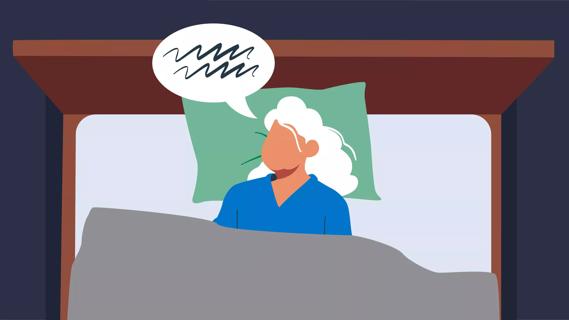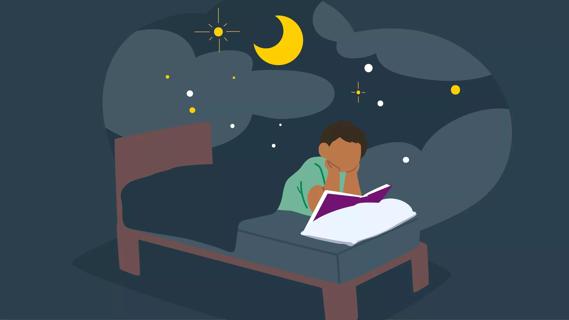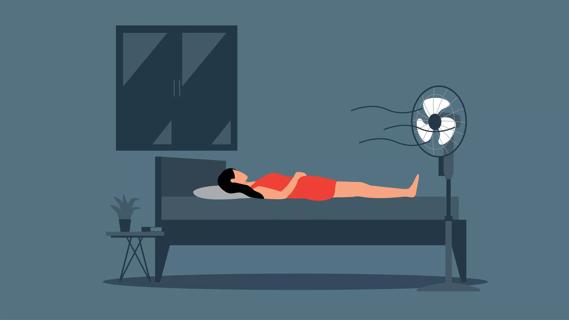Advertisement
Signs, causes and ways to address this problem

No, you’re not on the set of a zombie movie. It’s just your loved one sleepwalking through the hallways in the middle of the night again.
Advertisement
Cleveland Clinic is a non-profit academic medical center. Advertising on our site helps support our mission. We do not endorse non-Cleveland Clinic products or services. Policy
Sleepwalkers can actually move (and drive!) as if they were awake. It can be startling to see someone do this and it may frighten your family members if you do it, too. There are a lot of things that can happen during a sleepwalking episode, so your mind races to all the ways you can keep your loved one safe.
Sleep specialist Nancy Foldvary-Schaefer, DO, MS, explains what signs to look out for and what to do about the problem so you can keep the sleepwalker as safe as possible. (Or, you can send the information to your family members so they can help keep you safe.)
When it comes to sleepwalking, also known as somnambulism, there isn’t a one-size-fits-all for how a sleepwalker should behave. Some people with abnormal sleep movements just sit up in bed and move their legs as if they’re walking. Others may actually get up and complete tasks like dressing, undressing, eating or even driving.
“A sleepwalking person walks or makes other movements that appear to have a purpose,” says Dr. Foldvary-Schaefer. “This happens when they’re in a state of partial wakefulness from the deep sleep cycle.”
A sleepwalking episode happens about one or two hours after going to bed and can last anywhere from one to 30 minutes.
The part that makes some people nervous is the fact that sleepwalkers have open eyes and a blank facial expression. It’s usually difficult and often impossible to wake them up, but when they do wake up, they don’t remember a thing about their overnight behavior.
“Sleepwalking and related arousal disorders represent one of the least researched areas of sleep medicine,” she says. “We aren’t sure of the exact causes. Even so, it’s believed that sleepwalking occurs because the brain has trouble properly regulating the sleep and wake cycles.”
Sleepwalking is common in school-aged children and often associated with bedwetting during sleep. It usually goes away on its own and well before adulthood. As the nervous system matures, children begin to sleep through the night. The Sleep Foundation reports that 29% of children ages 2 to 13 experience sleepwalking and about 4% of adults experience it, too.
When it lasts into adulthood, or begins later on in life, there may be other underlying causes. Research supports a genetic basis for some arousal disorders — this means they can be inherited.
Advertisement
“Major life stressors like extreme physical or psychological stress, sleep deprivation, a noisy sleeping environment or extensive travel across time zones may cause adults to begin sleepwalking,” says Dr. Foldvary-Schaefer. “Other triggers could be sleep apnea or prescription sleep medications.”
Sleepwalking is part of a spectrum of disorder or abnormal arousals that also includes confusional arousals like waking appearing confused without memory, sleep terrors, waking with intense screaming and autonomic activation without awareness. All three types can occur in adults and children but they all are more common in children.
If you experience sleepwalking or other abnormal movements or behaviors arising from sleep, your doctor will look for an underlying cause by conducting a sleep study in the sleep lab. Once an underlying cause is identified and treated, the sleepwalking often goes away.
For the most part, sleepwalking is harmless, but in some cases, there’s a chance you or someone you know could cause harm to themselves or others.
“These disorders can be disruptive and lead to sleep deprivation and injury, so it’s a good idea to discuss it with your doctor and decide together whether it needs to be investigated further,” says Dr. Foldvary-Schaefer.
There are steps you can take to help ensure the safety of a loved one or yourself. To prevent or subdue abnormal sleep movements:
To prevent injury:
In cases where a person has a history of hurting himself or others, a consultation with a sleep specialist might be necessary. Sometimes, doctors specializing in sleep medicine will prescribe certain medications to manipulate a sleepwalker’s sleep cycle and prevent their abnormal movements.
Your first instinct might be to wake someone up if you see a sleepwalker standing in front of the fridge or wandering throughout the house in the middle of the night. The Sleep Foundation recommends speaking in a quiet voice and using a light touch to direct them back to bed. If you try to wake them up in a loud, harsh manner, they may wake up confused, scared or disoriented.
Getting a good night’s sleep is crucial for your overall health. If you’re not getting a good night’s sleep because you or a loved one is sleepwalking, consult your doctor to discuss your concerns.
Advertisement
Learn more about our editorial process.
Advertisement

Sleeping with separate blankets can help you get the ZZZs you need — without fighting for covers all night

Stress, weight gain and forgetfulness are just a few effects of losing sleep

Stress, alcohol, sleep apnea and (you guessed it!) scary movies are a few common causes of bad dreams

Recording your dreams may help you become more mindful, understand your thought patterns, process your emotions and even reduce your stress

Chamomile, lavender and valerian root teas may offer a faster route to dreamland

Many factors can contribute to sleep talking, like stress or anxiety, lack of or low-quality sleep, or even more serious sleep-related conditions

A consistent, structured routine, which may include incentives, can help children learn to stay in bed and get the ZZZs they need

Getting to the root cause of night sweats — like menopause, medication side effects, stress or anxiety — can help you manage them

Focus on your body’s metabolic set point by eating healthy foods, making exercise a part of your routine and reducing stress

PFAS chemicals may make life easier — but they aren’t always so easy on the human body

While there’s little risk in trying this hair care treatment, there isn’t much science to back up the claims